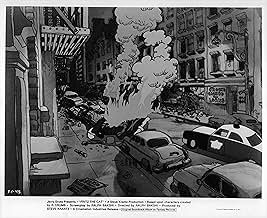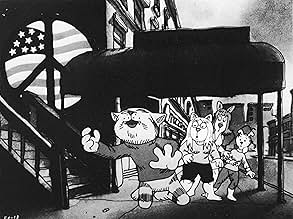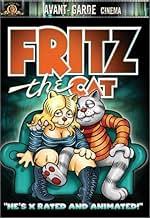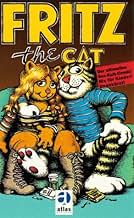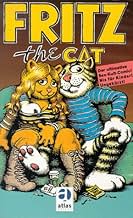In the late 1960s, a pretentious, womanizing young cat drops out of college, starts a riot in Harlem, hits the road with an ex-girlfriend and gets mixed up with domestic terrorists.In the late 1960s, a pretentious, womanizing young cat drops out of college, starts a riot in Harlem, hits the road with an ex-girlfriend and gets mixed up with domestic terrorists.In the late 1960s, a pretentious, womanizing young cat drops out of college, starts a riot in Harlem, hits the road with an ex-girlfriend and gets mixed up with domestic terrorists.
Skip Hinnant
- Fritz the Cat
- (voice)
Rosetta LeNoire
- Bertha
- (voice)
- …
John McCurry
- Blue
- (voice)
- …
Judy Engles
- Winston Schwartz
- (voice)
- …
Phil Seuling
- Pig Cop #2
- (voice)
Ralph Bakshi
- Narrator
- (voice)
- (uncredited)
- …
Charles Spidar
- Bar Patron
- (voice)
- (uncredited)
- …
- Director
- Writers
- All cast & crew
- Production, box office & more at IMDbPro
Featured reviews
The story concerns a classic 60's hero, Fritz, and his adventures through the urban underground
He loves sex and constantly claims and declares the glories of revolution
At first he is happy with just sex, but as the story moves through exotic adventures he discovers that the only way he can truly be a revolutionary is to join up with one of the militant groups
There, he's over his head
In sharp contrast to Walt Disney's soft characters, Fritz is seen providing a bunch of screaming female cats, placing drugs, and having lots of fun We are taken through Harlem where, in this case, the blacks are portrayed as jive-talking crows Fritz is not a fantasy, but an animation venture into super-reality, at least as Bakshi sees it
The animation is unpolished, graceless, but very effective It has an unrefined or unfinished, renewable energy that brings out some of the social results of the confused sixties
In sharp contrast to Walt Disney's soft characters, Fritz is seen providing a bunch of screaming female cats, placing drugs, and having lots of fun We are taken through Harlem where, in this case, the blacks are portrayed as jive-talking crows Fritz is not a fantasy, but an animation venture into super-reality, at least as Bakshi sees it
The animation is unpolished, graceless, but very effective It has an unrefined or unfinished, renewable energy that brings out some of the social results of the confused sixties
I'm not particularly a cartoon-fan. I saw " Fritz the cat" in an obscure movie theatre in Ghent (Belgium)in the early seventies. There were about 5 people in the theatre and 2 left after half an hour.
I enjoyed the story: it's about a young guy who discovers the "real" world with all his odd aspects, as the situation was in the late sixties.
The music in this film is super: I discovered the great Charles Earland (Black talk), Duke's Theme from Ray Shanklin, Mamblues (Cal Tjader), Bertha's theme (Ray Shanklin) and even Billy Holiday 's wonderful "yesterdays".
Those who believe there are racist tendencies in the movie don't dig anything about "Jewish" humour.
After having watched this movie, I left the cinema with the conviction:" Hey, in fact I am Fritz the cat ", and believe me, at that time, I was!
I enjoyed the story: it's about a young guy who discovers the "real" world with all his odd aspects, as the situation was in the late sixties.
The music in this film is super: I discovered the great Charles Earland (Black talk), Duke's Theme from Ray Shanklin, Mamblues (Cal Tjader), Bertha's theme (Ray Shanklin) and even Billy Holiday 's wonderful "yesterdays".
Those who believe there are racist tendencies in the movie don't dig anything about "Jewish" humour.
After having watched this movie, I left the cinema with the conviction:" Hey, in fact I am Fritz the cat ", and believe me, at that time, I was!
That is how the 1960s were described by the narrator in the beginning of this film. Fritz the Cat is a famous movie for a number of reasons, most stemming from it being the first feature-length adult cartoon and having an "X" rating. There were controversies surrounding its creation with director Ralph Bakshi and character creator Robert Crumb. The film is like nothing I have ever seen before. It has a unique animation process that makes everything reek seediness, despair, and cry for social change. Bakshi wrote the script which really is nothing more than the knife that cuts through all the 60's BS - from existentialism to the drug culture to the love generation to African-American perspectives to militancy. Nothing is spared as the counterculture is laid bared and examined through the eyes, ears, fears, and desires of Fritz the Cat. Along the way, Fritz experiments with just about anything - including lots of sex, drugs, and sex. While the film definitely is quite vulgar in many ways with some of the most odious characterizations of otherwise cute and cuddly animals and depicting lots of strong sexual situations(though in no way deserving the "X" by today's standards), Fritz the Cat is also an intelligent look at one character's drive to find himself and meaning in his life - perhaps a symbol for the whole decade the film is examining. The end result is nothing conclusive - also perhaps a symbol. Bakshi's script is in some ways profound and thought-provoking and in some ways infantile and vile - his obvious dislike of police just one example. But what had my attention more than anything else was the animation - particularly in exterior shots not containing characters. There is one scene where the slums of Harlem are integral to the story. Bakshi uses his camera to zoom in on quite an impressive animated background shot of a field lost amongst the slums of Harlem. It is the very essence of seedy existence in an uncaring world. There are many other shots too that have that same power, but let's not forget that even with the intelligent at times script and the animation, much of Fritz the Cat is used solely to arouse - either arouse some primal feelings or arouse offense. A landmark film at any rate whether for good or for bad.
Anyone who didn't like Fritz the Cat is not looking at the film in the right way. A lot of the reviews I've read basically said that it is nothing more than a bad film that strives only on shock value to get an audience. I also read that it doesn't have much of a storyline and only revolves around sex and drugs......so what else did you expect a movie about the slackers of the 60s to have? Did the stoners of that decade NOT behave the way Fritz does in the movie? In order to understand the point of the movie you have to put yourself into Fritz's shoes and let him guide you through his life as a college drop-out trying to find his purpose (Existentialism for those who are not familiar with philosophy) in life and still have a good time. Of course his journey leads you to animal orgies and a crow that hides pot in awkward places, but that is the beauty of this movie--it's about freedom! I also do not believe it is outdated because Fritz's trippy surroundings and his pseudo-intellectual thoughts were enough to make me melt! It's all about the mood. The animation and music put the viewer in a hypnotic state where nothing else matters except pleasure and happiness. If you can't identify with Fritz then you have lost the feel of what it's like being young.
And just for some peoples' info. the movie is not X-rated because it has explicit sex scenes (any viewer of pornography, also X-rated in some form, knows that we have seen much more of the human body then is depicted in this film), it is X-rated because there are CARTOON ANIMALS HAVING SEX. Anyone who would give this film an R-rating because there are no close-ups should not plan on an MPAA career in the near future
And just for some peoples' info. the movie is not X-rated because it has explicit sex scenes (any viewer of pornography, also X-rated in some form, knows that we have seen much more of the human body then is depicted in this film), it is X-rated because there are CARTOON ANIMALS HAVING SEX. Anyone who would give this film an R-rating because there are no close-ups should not plan on an MPAA career in the near future
I came across the recently released DVD of this film in, of all places, the children's video section of Virgin Megastore. Whether or not this poorly miscategorized placement was of simple ignorance or whether the intent weas subversive and it was intentionally and deliberately placed in the children's section, I found myself grinning and reluctant inform anyone of the error. After all, nobody gave me any forewarnings when I was a kid either, as some things you just have to discover on your own, and the thought of some poor innocent parents popping this film on for their kid only to look on in horror at the visions that would soon unfold sounded dastardly and funny indeed.
I was 7 years old when Fritz the Cat first hit the screen, and while I didn't see the film for the first time until I was well into my twenties, the film nevertheless had a lasting impact on my childhood. This film had taken on a reputation of mythical proportions in my Brooklyn hometown neighborhood, partly due to the older teens on my street who were all too eager to share shocking details contained therein, as only the best subversive intentions can do, and further securing the film's status as "every parent's nightmare". To a child about to undergo serious growing pains and a naturally growing curiosity towards all things "adult-related", Fritz the Cat was very much my earliest childhood memory of the themes of sex, drugs, rock-n-roll, racism, you name it, and it was a symbol for naughtiness that all coming of age kids couldn't wait to catch a sneak peak of, or at least couldn't wait to reach the age when we could view such subject matter freely.
As a movie, it hasn't lost any of it's impact in 30 years, and fewer films truly capture the grittiness and raw edge of New York city in the 70's (French Connection is another good example). I dare say that it could be considered more offensive now than ever, as I fear that today many just might not "get it," despite our self-proclamation that we've come a long way in maturity and tolerance of such sensitive issues. Modern society has become so politically correct and desensitized to controversial issues that we're less tolerant and understanding of the original intent of a film such as this, especially when it's messages are not consistent with our modern value system. Thus, some of the obvious stereotypes presented in this film (such as the pigs portraying cops and the crows portraying blacks, for example), could never be presented in a film today. Granted, these images were meant to be offensive in the 70's as well, but they were obviously taken in a different light back then, as they were indicative of a specific brand of biting satire found in the 70's and hippie culture and a reflection of how that particular generation could openly address such social issues. These issues, such as racism, are clearly still relevant today, we just address them in a different manner, which is why Fritz the Cat still has potency yet is more or less looked upon as a curious time capsule of a bygone era today.
I was 7 years old when Fritz the Cat first hit the screen, and while I didn't see the film for the first time until I was well into my twenties, the film nevertheless had a lasting impact on my childhood. This film had taken on a reputation of mythical proportions in my Brooklyn hometown neighborhood, partly due to the older teens on my street who were all too eager to share shocking details contained therein, as only the best subversive intentions can do, and further securing the film's status as "every parent's nightmare". To a child about to undergo serious growing pains and a naturally growing curiosity towards all things "adult-related", Fritz the Cat was very much my earliest childhood memory of the themes of sex, drugs, rock-n-roll, racism, you name it, and it was a symbol for naughtiness that all coming of age kids couldn't wait to catch a sneak peak of, or at least couldn't wait to reach the age when we could view such subject matter freely.
As a movie, it hasn't lost any of it's impact in 30 years, and fewer films truly capture the grittiness and raw edge of New York city in the 70's (French Connection is another good example). I dare say that it could be considered more offensive now than ever, as I fear that today many just might not "get it," despite our self-proclamation that we've come a long way in maturity and tolerance of such sensitive issues. Modern society has become so politically correct and desensitized to controversial issues that we're less tolerant and understanding of the original intent of a film such as this, especially when it's messages are not consistent with our modern value system. Thus, some of the obvious stereotypes presented in this film (such as the pigs portraying cops and the crows portraying blacks, for example), could never be presented in a film today. Granted, these images were meant to be offensive in the 70's as well, but they were obviously taken in a different light back then, as they were indicative of a specific brand of biting satire found in the 70's and hippie culture and a reflection of how that particular generation could openly address such social issues. These issues, such as racism, are clearly still relevant today, we just address them in a different manner, which is why Fritz the Cat still has potency yet is more or less looked upon as a curious time capsule of a bygone era today.
Did you know
- TriviaThere is no evidence that Robert Crumb filed suit to have his name removed from the film's credits. Contradictory to this claim, Crumb's name continues to appear in the credits, even on home media releases. His name, however, does not appear in the credits for Les neuf vies de Fritz le Chat (1974).
- GoofsWhen he emerges from the trash can, Fritz's outfit changes color from red to blue to red again between shots.
- Alternate versionsWhen aired during the Groundbreakers block on Playboy, the scene of Harriet's rape is heavily edited. The movie is otherwise uncut.
- ConnectionsFeatured in Precious Images (1986)
- How long is Fritz the Cat?Powered by Alexa
Details
Box office
- Budget
- $700,000 (estimated)
- Runtime
- 1h 18m(78 min)
- Color
Contribute to this page
Suggest an edit or add missing content


